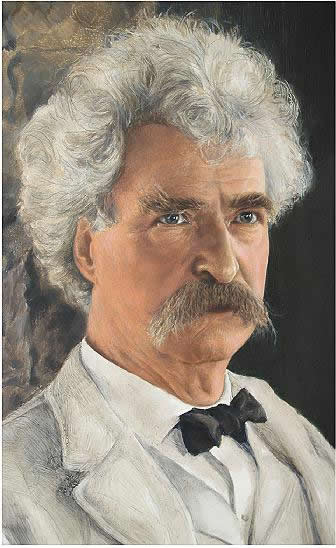

 "Painted over" photo of Mark Twain. Unknown artist. Photo courtesy of Dave Thomson. |
I know one thing--that a certain amount
of pride always goes along with a teaspoonful of brains, and that this pride
protects a man from deliberately stealing other people's ideas. That is
what a teaspoonful of brains will do for a man--and admirers had often told
me I had nearly a basketful--though they were rather reserved as to the
size of the basket. - "Unconscious Plagiarism" speech, 1879 |
| .....substantially all ideas are second-hand,
consciously and unconsciously drawn from a million outside sources, and
daily used by the garnerer with a pride and satisfaction born of the superstition
that he originated them; whereas there is not a rag of originality about
them anywhere except the little discoloration they get from his mental and
moral calibre and his temperament, which is revealed in characteristics
of phrasing. . . . It takes a thousand men to invent a telegraph, or a steam
engine, or a phonograph, or a photograph, or a telephone, or any other Important
thing-- and the last man gets the credit and we forget the others. He added
his little mite--that is all he did. In 1868 I read Dr. Holmes's poems, in the Sandwich Islands. A year and a half later I stole his dedication, without knowing it, and used it to dedicate my "Innocents Abroad" with. Ten years afterward I was talking with Dr. Holmes about it. He was not an ignorant ass--no, not he; . . . and so when I said, "I know now where I stole, but who did you steal it from?" he said, "I don't remember; I only know I stole it from somebody, because I have never originated anything altogether myself, nor met anybody who had." - Letter to Anne Macy. Reprinted in Anne Sullivan Macy, The Story Behind Helen Keller (Garden City, N.Y.: Doubleday, Doran, and Co., 1933), p.162. |
The kernel, the soul-- let us go further and say the substance, the bulk, the
actual and valuable material of all human utterances--is plagiarism....
...a grown person's memory-tablet is as a palimpsest, with hardly a bare space
upon which to engrave a phrase.
- Letter to Helen Keller, St. Patrick's Day, 1903
| Nothing is ours but our language, our phrasing. If a man takes that from
me (knowingly, purposely) he is a thief. If he takes it unconsciously--snaking
it out of some old secluded corner of his memory, and mistaking it for a
new birth instead of a mummy -- he is no thief, and no man has a case against
him. Unconscious appropriation is utterly common; it is not plagiarism and is no crime; but conscious appropriation, i. e., plagiarism, is as rare as parricide. Of course there are plagiarists in the world--I am not disputing that--but bless you, they are few and far between. These notions of mine are not guesses; they are the outcome of twenty years of thought and observation upon this subject. - Letter to Robert Burdette, circa April 19, 1890 |
...all our phrasings are spiritualized shadows cast multitudinously from our
readings...
- Mark Twain's Autobiography
But lemme correct you in one thing -- I mean soothe you with one fact: a considerable
part of every book is an unconscious plagiarism of some previous book. There
is no sin about it. If there were, and it were of the deadly sort, it would
eventually be necessary to restrict hell to authors -- and then enlarge it.
- letter to editor of Grants Pass Observer dated April 2, 1887. Reprinted
in The Morning Oregonian, May 4, 1910, p. 10.
Solomon, when he said there was nothing new, meant also there were no new literary
styles under the sun, either.
- quoted in Twenty Years in Europe by Samuel H. M. Byers
Quotations | Newspaper Articles | Special Features | Links | Search